

Can you and should you do a PHD right after undergrad?
by Talha Omer, MBA, M.Eng., Harvard & Cornell Grad
In all posts.
In many parts of the world, the traditional route is that students must do a Master’s degree before they can do a PHD . However, in some countries, including the US, there is a non-traditional route whereby you can skip the Master’s degree and go directly for a PHD . Now the question arises, should you do a PHD right after your undergrad?
In this Article
Improves your chances of getting into a PHD program
Gain perspective, it will be helpful if you want to do your phd in europe, experience different universities, test the waters first, may save you time, can easily acquire funding , get straight to business, you don’t have to move again, it’s a massive adjustment, lack of research experience, doing a master’s and then phd.
Doing a Master’s first is the traditional route of acquiring a PHD. In many Asian and European countries, you cannot enroll directly in a PHD program right after your bachelor’s. You have to complete a one-year or a two-year master’s program before becoming eligible for a doctorate program. Let’s delve into some of the pros and cons of doing a Masters before doing a PHD.
Let’s suppose that you didn’t do very well in your undergrad. Since PHD admissions are far more competitive than masters , you will have a hard time getting directly into a PHD program.
Opting for a master’s degree first allows you to recuperate your chances of being accepted for a PHD because an admissions board will consider your master’s CGPA instead of your bachelor’s.
Moreover, by doing a master’s first, you will also acquire more research experience and build a strong relationship with professors who can write you stellar letters of recommendation , and believe me, LORs go a long way in getting you into a doctorate program.
Furthermore, an impeccable master’s record will allow you to apply to even more selective doctorate programs than you with your undergrad record.
You might be unsure about which field you want to do your doctorate in. By doing a master’s first, you get to experience your interests first without committing to a 6 to 7 year long doctorate program . If you find that your research interests lie somewhere else after doing your masters, then you have the option to explore and change your field for your doctorate .
If you are thinking about doing your doctorate from Europe and would like to keep your options open, there is no harm in doing a master’s first, as it will allow you to study abroad for your Ph.D. Even if you change your mind by the end of your master’s and decide to do your doctorate from the US, it will have no adverse effect on your prospects and help you because some fields such as public health and social work require a master’s degree before Ph.D.
Doing a master’s first also gives you the chance to experience multiple universities as you have the option to do your Ph.D. from another university. Each university has a distinct academic environment, and experiencing a different university can give you a broader perspective.
It might be the case that you are uncertain about pursuing a doctorate. If that’s the case, then a master’s degree can offer you ample time to make up your mind .
Unlike a Ph.D., it is rare that you would secure funding for a master’s program. Sure, you might be able to find some grants or scholarships, but they are rare and competitive. A lot more students apply to masters each year than they do to Ph.D.
Doing a Ph.D. directly
Students can enroll in a doctorate program directly in the US as most Ph.D. programs don’t require a graduate degree. However, this is the road less traveled when you compare the number of applicants with the traditional route. There are still some pros and cons to this route, which you can find below.
Many American Ph.D. programs do not offer any significant coursework reduction to students who have already done a master’s before their Ph.D. This means that undergrad students will end up doing 5 to 7 year Ph.D. on top of their 1 to 3-year master’s degree. If this is the case, then doing a doctorate directly after college can potentially save you multiple years.
You won’t have to worry about funding your Ph.D. because most doctorate programs either offer full or partial funding to students, and some even pay additional living stipend every month.
Moreover, doctorate students also have more funding options outside of their universities. Many national grants and fellowships favor Ph.D. work over master’s studies, which can help your funding situation.
Those students who are sure about their research interests can dive straight into their Ph.D. work without any delays. If you have already identified specific supervisors you would like to study under and are sure about your goals, why delay it with a master’s?
While it is true that doing a master’s first will expose you to an additional university environment, moving again and again is not exactly a pleasant experience. If you directly enroll in a Ph.D. program, you only have to move once, saving you a lot of time and money.
Going from an undergrad school’s relatively tame academic environment to a doctorate program isn’t exactly an easy undertaking. It is tough to get accustomed to the significantly different climate , course work, techniques, and relationships with the faculty. Students coming from graduate school would have already experienced all this and would fit right in.
A crucial part of a master’s degree is writing a research proposal for your thesis. This is where a student would submit an outline for a research topic, and it typically forms part of the Ph.D. application as well.
Students who apply directly to a doctorate program would have a tough time coming up with a research proposal as they would lack experience. On top of that, even when you submit a research proposal, the research may already exist , which will further cause problems and delays.
Discover How Much Homework To Expect In a College Literature Class
Explore How Much Homework To Expect In A College Literature Class Students who attend literature classes often seek help with literature homework. The reason for this necessity is that people are not accustomed to reading printed books anymore. Though literature helps...
Balancing Work and Study: 9 Things to Keep in Mind
Image Source Balancing work and study can be a tough challenge, especially when you're trying to excel in both. Whether you're a student working to support your education or a professional pursuing further studies, managing these responsibilities requires careful...
How to Study for an Online Master’s Degree in Education: 10 Tips
Image Source Pursuing a Master's in Education online can be a transformative experience that combines flexibility with a rigorous academic curriculum. This mode of learning allows you to advance your career in education without the constraints of traditional on-campus...
9 Reasons to Pursue an Online Ed.D Program
Image Source The Doctor of Education, commonly known as the Ed.D, is a prestigious degree aimed at those aspiring to reach the highest levels of achievement in educational practice and administration. Unlike traditional doctoral programs focused primarily on research,...
Tips for Writing Exam Essays
Writing essays for exams can feel like a huge challenge. You're under time pressure, feeling stressed, and expected to produce a well-organized, persuasive piece of writing. While some students may be tempted to seek out a top essay writing service for quick...
Write Your Successful Business Management Essay
Business Management Essay Writing: Step to Success A business essay is a short piece in which the author highlights some problems or business ideas and his achievements. Applicants, students and employees can write such an essay. Features of the business management...
How to Choose the Best Dissertation Writing Company
Guide on How to Choose the Best Dissertation Writing Company For many years the students have been ordering help with dissertations. Many such services have become extremely popular approximately 10 years ago and since then such websites only gain in popularity. For...
20 Best GRE Mock Taking Strategies by 330+ Scorers
Scoring 330+ on the GRE is a phenomenal achievement. But how do the top scorers do it? Good study habits and resources are key, but so is a strategic approach to mock tests. In my last blog post, I talked about the best mock exams for the GRE, but I didn't delve into...
Guide on Where Can I Buy a Custom Essay Online?
Explore Where Can I Buy a Custom Essay Online? How to write an essay? Such a question is a main problem for schoolchildren and students because more and more often teachers offer to write a text in the essay genre. This type has become very popular, so we have...
20 GRE Full-Length Practice Test 2024 (Shorter GRE)
The GRE saw a significant change in September 2023. The revised exam is shorter, with adjustments to the section format and time limits. With a streamlined structure, your preparation strategy will also need an update. Fortunately, numerous high-quality mock exams can...
WANT MORE AMAZING CONTENT?
- Free GRE Practice Questions
- 100+ Personal Statement Templates
- 100+ Quotes to Kick Start Your Personal Statement
- 390 Adjectives to Use in a LOR
Master’s First or Straight to PhD?
So you know you want to do a PhD someday. Let’s assume you already have a Bachelor’s degree and that some of the PhD programs you are considering don’t require candidates to already have Master’s degree for admission. Do you do a Master’s first or apply straight to PhD programs? There are advantages (and disadvantages) to each option.
Master’s then PhD
This is the traditional route to earn a PhD and is still widely used in Europe.
- Time commitment -The initial time commitment for a Master’s degree (one to three years) is shorter than the PhD (three to seven years).
- Not as competitive -In general, admission for Master’s programs isn’t as competitive as for PhDs. This can benefit students whose undergraduate performance wasn’t strong enough to be admitted into PhD programs right away. By doing a Master’s degree they can get more research experience, add to their CVs, and build relationships with professors who can write better letters of recommendation. An outstanding Master’s record might even allow the student to apply to more selective PhD programs than they could straight out of undergrad.
- Explore your interests -For students that don’t have a clear idea of what they want to study at the PhD level, a Master’s is a great way to explore their options and figure out where their research interests lie. Doing a Master’s degree can also help someone who wants to change fields for their doctorate. By gaining research experience in their new field they will be a more competitive candidate for PhD programs.
- Might be required for PhD admission -In some fields such as public health and social work a Master’s degree is required or recommended for admission to a PhD program. Additionally, students intent on pursuing a PhD in Europe will need to to have a Master’s to meet the admissions requirements the majority of European PhD programs.
- Experience at multiple universities -Each university has a different academic environment and its own approach to research. An advantage of doing a Master’s and then a PhD is the exposure to academic life at an additional university.
- Get rid of doubts - If a student has any hesitations about pursuing a doctorate, a Master’s degree is a way to test the waters before committing to a PhD.
Disadvantages
- Funding -Depending on the field of study, funding for a terminal Master’s degree can be more difficult to come by. Sometimes there are grants, scholarships, or teaching positions available to these students to partially cover the cost, but not to the same extent as for PhD students.
Straight to PhD
In the United States, a Master’s degree is not required for admission to most PhD programs. It is possible and not unusual to be admitted to a PhD program straight out of undergrad. The number of direct entry PhD programs has started to rise in Canada as well, though earning a Master’s and then PhD is still more common. In Canada, it is also possible for academically promising students to begin a Master’s degree and then “fast track” or transfer to the PhD program without completing the requirements of the Master’s degree.
- Time commitment -Many American PhD programs do not offer significant coursework reduction for students who already have Master’s degrees. This means that they will have to do a five to seven year PhD on top of their one to three year Master’s. If this is the case, then starting a PhD directly out of undergrad is the faster choice.
- Funding -Funding is one of the top advantages of a direct entry PhD program. Most PhD programs offer students partial or full funding for their studies and many even pay them a stipend on top of a tuition waiver. There are also a greater number of external funding opportunities available to PhD students such as national grants and major fellowships which favour PhD work over Master’s studies.
- Long-Term Projects -The shorter time constraints of a Master’s degree make it difficult for students to set up and run the kind of long-term projects which might be necessary to properly address their research questions. It is more common for PhD students to go more in-depth and do multi-year experiments, lengthy studies, or a year of fieldwork as part of their degree.
- Start working right away -Students who have a clear understanding of their research interests and have already identified potential supervisors might prefer not to delay their PhD work by obtaining a Master’s first.
- Moving only once -While doing a Master’s first exposes a student to academic life at multiple universities, the flip side is that it requires moving twice: one for the Master’s and once for the PhD. Moving can be time consuming and expensive—especially if one or both degrees are done abroad.
- Will still earn a Master’s -Students in direct entry PhD programs will usually be awarded a Master’s degree along the way for course work completed during their doctorate.
- Withdrawing from the program -If the student decides to permanently withdraw from a direct entry or fast track PhD program they may be leaving without any degree. Depending on when in the program they withdraw it may be possible to be awarded a Master’s for coursework already completed, but this is dependant on the policies of the program.
Ultimately the decision about whether to do a Master’s first or apply directly for a PhD is a personal one that you have to make on your own. Take some time to think about these pros and cons as well as your own goals and priorities. Good luck with your applications!
Discover related jobs
Discover similar employers
Accelerate your academic career
Norwegian Academic Job Titles Explained
What's the difference between a professor and and førsteamanuensis? Here...
“Academic Positions helped me find the right PhD project.”
Oldouz will soon be starting her PhD in sustainability pathways and chal...
How to Write a Professional Academic CV
No matter what stage you are at in your academic career, having an acade...
Tips for Moving to the UK to Research or Study
The UK is a great place to study or research. Here is some practical adv...
Moving to Luxembourg to Research
Luxembourg has long been known as a leading European financial centre, b...
The Difference Between a CV and a Resume
The terms CV and resume are used interchangeably, however, there are sev...
Jobs by field
- Electrical Engineering 176
- Machine Learning 156
- Programming Languages 145
- Artificial Intelligence 138
- Molecular Biology 136
- Mechanical Engineering 133
- Cell Biology 127
- Electronics 113
- Materials Engineering 111
- Materials Chemistry 107
Jobs by type
- Postdoc 350
- Assistant / Associate Professor 139
- Research assistant 111
- Researcher 104
- Professor 103
- Engineer 84
- Lecturer / Senior Lecturer 64
- Management / Leadership 44
- Tenure Track 39
Jobs by country
- Belgium 318
- Netherlands 163
- Switzerland 125
- Morocco 120
- Luxembourg 63
Jobs by employer
- KU Leuven 122
- Mohammed VI Polytechnic Unive... 120
- Ghent University 81
- ETH Zürich 69
- KTH Royal Institute of Techno... 64
- University of Luxembourg 62
- University of Twente 49
- Eindhoven University of Techn... 47
- Karolinska Institutet 39
This website uses cookies
- EXPLORE Random Article
How to Prepare for a PhD as an Undergraduate
Last Updated: September 1, 2021 References
This article was co-authored by Carrie Adkins, PhD . Carrie Adkins is the cofounder of NursingClio, an open access, peer-reviewed, collaborative blog that connects historical scholarship to current issues in gender and medicine. She completed her PhD in American History at the University of Oregon in 2013. While completing her PhD, she earned numerous competitive research grants, teaching fellowships, and writing awards. This article has been viewed 77,356 times.
Getting a PhD is highly rewarding and equally tasking. You should get to know as far in advance as possible that there is a good amount of prep work to do. That said, you can begin planning for your PhD as early as freshman or sophomore year of undergrad. Preparing for a PhD requires you to plan, work hard and study hard, and getting to know the people around you.
Choosing the Path You Want

- Don't approach any professor at random. Look at the department you’re interested in, review who is teaching what, what their specific area of study is, and then contact them. For example, if you’re interested in linguistics you would go to the linguistics department website and look under the faculty tab. Here you will find a bio for each professor that can help you choose one or two professors to talk to.
- If you send an email, start with “Dear Professor Smith,” then ask if you can meet to ask questions about pursuing a PhD in linguistics. Sign the email with a cordial closing like “sincerely" and your name.
- If you go to their office hours, show up when the hours begin, politely knock on the door (even if it’s already open), and introduce yourself. You can say something like, “Hello Professor Smith, I am John Public and I’m interested in getting a PhD in linguistics. I’d like to ask you a few questions about the process. Is this a good time for you?”
- Don’t try to talk at length with the professor after class. They likely have another class or something already scheduled. What you can do, however, is inquire about setting a meeting, and then follow up with an email about the details.

- A good way to meet a current grad student is to contact a professor and ask for a list of people who would be willing to meet up with you. Then you can email the student directly to ask if they would be free to meet up over lunch or a cup of coffee. During the meeting be sure to thank them for taking the time to meet with you. Most importantly, you need to come with a list of questions you have about grad school, and also be open to listen to any advice they have to give that isn’t on your question list.
- For example, you might ask “how much does grad school cost, and how do I pay for it?”, or inquire about what is required of them. You might also ask, “what are the best and worst things about grad school?” And also, “how do you handle the workload?”

- Make sure you also think about whether you want to get a PhD to work as an academic (i.e. a professor) or in the private sector. [2] X Research source Both paths can be rewarding, but the prep work can be wildly different. For example, an associate professor teaching psychology at a university will require a significant publication record, but going into private practice or working for the government requires much less.
Performing Well Academically

- Do you remember the semester you decided to take the extra class, suffered the loss of your childhood pet, or thought sleeping through geology was a good idea? The group of professors on the selection panel will understand one or two grade discrepancies on your transcript. After all, they were undergrads too. The panel will be less likely to overlook frequent or repeated bad grades and withdraws (classes marked by a W on your transcript), even if they are in non-major courses or general prerequisites.
- To work as hard as you can, do homework and study on a daily basis. When you don’t understand the material, go to your professor’s office hours with specific questions and examples of what you don’t get. Also, don’t be afraid to go to the tutoring center or hire a private tutor. This will provide detailed, first-hand help with the course material.

- General education classes are designed to provide a well-rounded, general education that gets you ready for more specific courses. These classes are required at the University level for all students to complete. For example, you’ll likely need to complete freshman level English classes, a few science courses, and perhaps writing classes.
- Major classes are more specific courses that the major or department requires. If you’re a language major, you’re likely required to take a general linguistics class, several survey courses in literature and culture, and depending on the state you go to school in, you’ll have to pass a language-specific written and oral test. These requirements are put in place to make sure that you will be ready to take graduate-level courses and perform well.
- Many universities also offer cross-listed classes, which are courses open to both graduate and undergraduate students. Take a few of these to get an idea of the work you’ll be doing. This is also a great way to meet grad students and make your introduction.

- There are several ways to prepare for the GRE or other important entrance exams. The most obvious but often overlooked is to work hard throughout your undergrad education. This means study early for each class and study often.
- Many people find it helpful to buy test preparation materials to study for the exam. For example, you can purchase GRE prep manuals from Kaplan, ETS, or The Princeton Review. You can usually find online or in-print materials available. Often the materials can be used in conjunction with a class that is meant to prepare you for the exam. These same companies also likely have courses available.
- If you’re looking to seal the deal, try hiring a tutor who is trained in test preparation. There are several national companies like Wyzant, Varsity Tutors, and Sylvan who have tutors trained in this area. It’s also likely that there are many local companies who offer the same services. Finally, check with your college or university’s student services center, as they may have several on-campus options.

- You need to ask the right person. Ask a full-time faculty member who is an assistant, associate, or full professor. Many times the person teaching your introduction course, the principles of economics class, or the first 4 or 5 semesters of most language courses is a graduate teaching assistant, and their letter will not carry as much weight as would that of a faculty member. Ask for letters of recommendation usually toward the end off your junior year, when you’re filling out the applications.
- Give the person at least three weeks to write the letter if possible. Professors usually have to teach, perform research, grade, serve on multiple committees, advise students, and go to department meetings, so providing sufficient time is best. However, if an important grant or new opening at a PhD program comes up and you’re in good standing with your psycholinguistics professor, go ahead and ask politely for a letter of recommendation. The worst thing they could say is no.
Gaining Experience

- Several options exist for learning a new language. One of them is to take classes in a language at the university you are already attending. You can also take courses at private language schools in your area, study with language learning software like Rosetta Stone or Fluenz, use a language learning app on your phone like Duolingo or Babbel, or hire a private language coach.
- Regardless of which option you choose, be sure to bolster your skills with practice. You can practice your language skills by watching movies, listening to music, joining a local club or society, and hiring a conversation partner.

- You can get research experience by applying for part-time positions in a laboratory, department, or a related job outside the university. For example, if you want to study cognitive development, you can apply to work in a psychology lab, a medical center that specializes in cognitive disorders, or even volunteer in the psychology department.
- Other opportunities include paid or unpaid internships, which can be found in a variety of places. For example, legal offices, court houses, large medical centers, museums, and many more places usually have many openings. Be careful though, these positions may fill fast, so be on the look out.

- There are a lot of ways to improve organizational skills. For example, focus on a few skills at a time, like improving time management. [5] X Research source You can also work on learning to set priorities, doing what’s more important first and saving less crucial tasks for later. [6] X Research source

Expert Q&A

- Hold out for a top choice, instead of settling for a program that doesn't meet your needs. If you don't get in one year, wait and try again. Thanks Helpful 0 Not Helpful 0
- You don't have to carry straight on from your undergraduate degree to postgraduate studies. Consider other alternatives, like take a year out to travel or spend some time in the work force. Thanks Helpful 0 Not Helpful 0
- Graduate school can be all about research. Once you've met the GPA requirements for your school, research credentials carry extra weight. Thanks Helpful 0 Not Helpful 0
- It takes a lot of mental strength to cope up with the demands of graduate school, like the grueling pace, taking large amounts of well-intended criticism, or meeting pushy people. For that reason, every college and university has a student services center that provides counseling services, usually free for students, or already covered under most health insurances. Thanks Helpful 2 Not Helpful 0
- Getting a PhD is a huge time commitment. Make sure you’re committed and passionate. Thanks Helpful 3 Not Helpful 1
- Make sure you are certain a PhD is for you. It may sound like fun and being able to put Dr in front of your name may sound great, but this time-consuming process may be too expensive. Thanks Helpful 1 Not Helpful 0
You Might Also Like

- ↑ https://www.academics.com/prepare-for-a-phd
- ↑ http://blogs.plos.org/thestudentblog/2014/04/22/faqs-about-non-academic-jobs-jane-hu/
- ↑ http://www.asha.org/public/speech/development/The-Advantages-of-Being-Bilingual/
- ↑ https://www.postgrad.com/advice/phd/how_to_prepare/top-tips/
- ↑ http://www.briantracy.com/blog/time-management/mastering-time-management-and-organizational-skills-to-increase-productivity/
- ↑ http://www.mtdtraining.com/blog/how-to-improve-organisational-skills-to-reduce-stress.htm
About this article

Did this article help you?

- About wikiHow
- Terms of Use
- Privacy Policy
- Do Not Sell or Share My Info
- Not Selling Info
US South Carolina
Recently viewed courses
Recently viewed.
Find Your Dream School
This site uses various technologies, as described in our Privacy Policy, for personalization, measuring website use/performance, and targeted advertising, which may include storing and sharing information about your site visit with third parties. By continuing to use this website you consent to our Privacy Policy and Terms of Use .
COVID-19 Update: To help students through this crisis, The Princeton Review will continue our "Enroll with Confidence" refund policies. For full details, please click here.
- Professional
Grad School Advice & Tips
GRE® Test Prep

Graduate School Application Timeline
Find out key deadlines for grad school applications and get a sample timeline for applying to graduate school.
- Sort by: Most Popular Sort by: Latest

How to Write a Statement of Purpose for Graduate School
Write a graduate school statement of purpose that will wow the admissions committee. ...

Find out key deadlines for grad school applications and get a sample timeline for applying to graduate ...

GRE Math Practice: Questions & Explanations
Can you ace these GRE math questions? Our GRE quantitative practice includes explanations for ...

GRE Verbal Practice: Questions & Explanations
Our GRE verbal practice questions come with step-by-step explanations. Get in some GRE ...

What is a Good GRE Score?
Find out what makes a good GRE score for your goals. Learn about GRE score percentiles, average scores, and more ...

Why You Shouldn’t Get a PhD
Is a PhD right for you? Consider all the obstacles and rewards to see if a doctorate degree is right for your ...

How to Choose a Grad School

Sending out dozens of grad school applications is expensive! Here's how to choose the right graduate schools to ...
How to Study for the GRE
A high GRE score begins with a smart GRE study plan. Learn how to study for the GRE at home or with the right prep ...

11 Easy Ways to Build Your GRE Vocabulary
GRE vocabulary is just as important as ever! Find out easy ways to study GRE words and test your ...
More articles.

Top 5 GRE Prep Myths
We debunk the top 5 GRE prep myths, so you can get your best score.

Are You Ready for Graduate School?
Find out if you’re ready for grad school before you apply. Consider these important questions to see if ...

8 Tips for International Applicants to U.S. Graduate Schools
Read expert tips for international students hoping to attend graduate school in ...

Should You Apply for a Graduate Teaching Assistantship?
Learn why you should apply for a teaching assistantship and how to get the TA gig.

GRE Essay Prompts
Get some GRE analytical writing practice by trying out these sample essay prompts. Then, read our explanations for what ...

Average GRE Scores: How Do Your Scores Compare?
Get up-to-date average GRE score information so you can compare your scores. Use average ...

Ask a PhD Student: Getting In (and Paying for) Grad School
PhD students shed light on writing successful statements of purpose, choosing ...

GRE Pop Quiz
Put your skills to the test with our quick GRE quiz. Each practice question has a detailed explanation so you can see how to ...

GRE Practice Questions
Try these free GRE practice questions, including verbal, writing, and quantitative practice. Read our in-depth ...
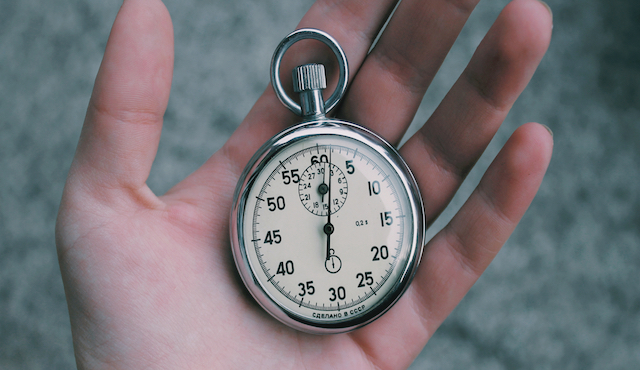
GRE Timing Tips: How Long is the GRE?
Learn how long the GRE takes, get timing breakdowns for every section, and walk into test day prepared ...

From Graduate School to Video Game Designer
Senior Producer Navin Supphapholsiri at Studio Wildcard gives us an in-depth look at how a ...

How to Find Success as a PhD Scholar
We asked real PhD student to tell us about the smartest moves they made in grad school and beyond.

Ask a PhD Student: All about Grad School Academics
PhD students answer questions around their dissertation topics, time management & finding ...

Featured Q & A with Adler University
Learn about graduate programs and offerings at Adler University

Why Rising College Seniors (and Recent Grads) Should Take the GRE
Find out how taking the GRE as a college senior or as a recent college ...

Featured Q & A with Tufts University, Graduate School of Arts & Sciences and the School of Engineering
Learn about grad programs at Tufts ...

Featured Q & A with California University of Pennsylvania
Learn about graduate programs and offerings California University of ...
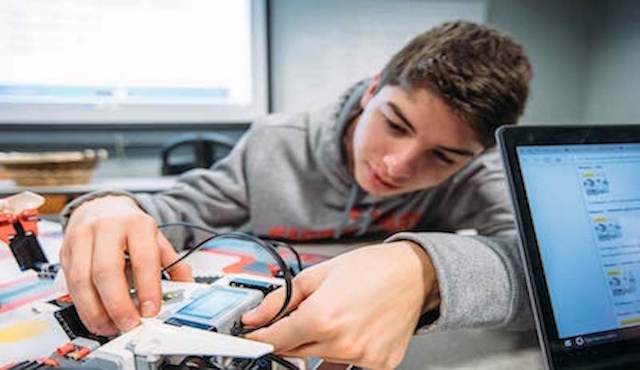
How a Degree in Computer Science, IT, or Cybersecurity Can Boost Your Career - Presented by Our Partners
There is demand for skilled software engineers, cybersecurity ...
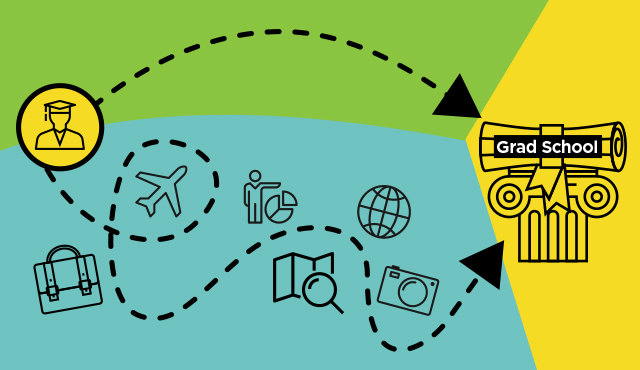
Should You Go to Grad School Right After Undergrad?
If you're deciding whether to go to graduate school right after college or work/travel ...
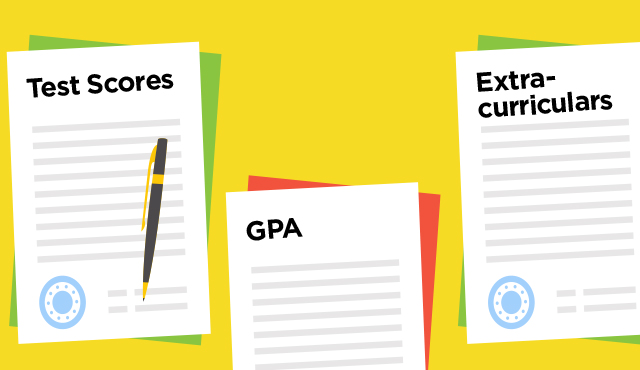
How To Get into Grad School With a Low GPA
If you're applying to grad school with a low GPA, here are eight ways to get into your chosen ...

How to Balance Grad School and Kids
Having a baby in grad school can be overwhelming. Get 8 tips on balancing graduate school with kids—and ...

How to Write a Great GRE Argument Essay
Are you ready for the gre essay section discover ten tips for acing the gre argument essay..

GRE Bridge Program: What You Need to Know
If you were planning to take the gre and had your test date canceled or postponed due to covid-19, ....

GRE Online FAQ: What You Need to Know During the Covid-19 Pandemic
With test centers closed due to the coronavirus pandemic, ets is offering ....

Your Guide to Going to Graduate School
If you're deciding whether or not to go to graduate school, use these guiding questions to help you ....

The GRE® General Test vs GMAT®: Which Exam Should You Take?
An increasing number of business schools are accepting gre scores in lieu of the ....

Your Job Search, Career Counseling, and Interview Tips - Presented by Our Partners
Learn about effective strategies to find a job, career counseling tips, and job ....

When to Take the GRE
When to take the gre, whether it’s while still in college, after graduation, or years after graduating, there is ....

Find Your Score! Free GRE Tests

Maximize Your Score! GRE Prep Courses
Most popular.
Enrollment Advisor
1-800-2REVIEW (800-273-8439) ext. 1
1-877-LEARN-30
Mon-Fri 9AM-10PM ET
Sat-Sun 9AM-8PM ET
Student Support
1-800-2REVIEW (800-273-8439) ext. 2
Mon-Fri 9AM-9PM ET
Sat-Sun 8:30AM-5PM ET
Partnerships
- Teach or Tutor for Us
College Readiness
International
Advertising
Affiliate/Other
- Enrollment Terms & Conditions
- Accessibility
- Cigna Medical Transparency in Coverage
Register Book
Local Offices: Mon-Fri 9AM-6PM
- SAT Subject Tests
Academic Subjects
- Social Studies
Find the Right College
- College Rankings
- College Advice
- Applying to College
- Financial Aid
School & District Partnerships
- Professional Development
- Advice Articles
- Private Tutoring
- Mobile Apps
- International Offices
- Work for Us
- Affiliate Program
- Partner with Us
- Advertise with Us
- International Partnerships
- Our Guarantees
- Accessibility – Canada
Privacy Policy | CA Privacy Notice | Do Not Sell or Share My Personal Information | Your Opt-Out Rights | Terms of Use | Site Map
©2024 TPR Education IP Holdings, LLC. All Rights Reserved. The Princeton Review is not affiliated with Princeton University
TPR Education, LLC (doing business as “The Princeton Review”) is controlled by Primavera Holdings Limited, a firm owned by Chinese nationals with a principal place of business in Hong Kong, China.

Can You Get a PhD without a Masters?
- Applying to a PhD
Yes, it’s possible to get a PhD without first having a Masters degree.
The conventional route for someone who earns a PhD is to pursue a Bachelor’s degree, followed by a Masters degree and then a PhD. However, several students opt to bypass a Master’s degree by enrolling onto a doctoral programme as soon as they complete their undergraduate degree.
Before we discuss how this can be done, it is worth mentioning the advantages and disadvantages of this route.
Advantages of Applying to a PhD without A Masters
The motivations for undertaking a PhD immediately after an undergraduate course are largely in saving money and time. This is because you will essentially eliminate a year of study. Another advantage of immediately enrolling onto a doctorate degree is project availability. If you find a project that you’re really interested in, it’s unlikely that it will still be available in a years’ time. Therefore, bypassing a Masters and enrolling directly into a PhD will increase your chances of securing the research project before it becomes unavailable.
Disadvantages of Applying to a PhD without A Masters
Although a Masters degree will add a year onto your academic journey, it can be incredibility helpful for your development and can help prepare you for a doctoral degree.
Not having a Master’s degree may prove to be a hindrance during your application process. This is because many other students will also apply to the same research projects, and it’s likely that the majority will hold a Masters. This will put you at a disadvantage to them.
Besides this, the dissertation project you’ll be required to undertake on a Master’s programme will provide you with a taste of what it is like to work on a research-based project. In addition to this, it’s likely that you’ll be able to select your own dissertation topic. As such, you can explore a specific field you’re interested in in further detail. This is a great way to confirm that both research-based work and the specific field you’re interested in are right for you before committing the next few years to it via a PhD.
Another advantage to the dissertation project associated with a Masters degree is the opportunity it provides you with to work closely with a project supervisor. This will help you understand the PhD student-supervisor relationship and communication frequency that works best for you. You can then use this knowledge to find supervisors who would compliment you when it comes time to find a PhD project to apply to. For tips on how to find a great PhD supervisor, check out our supervisor guide .
PhD without a Masters – How Does It Work?
To be considered for a PhD without a Master’s, at a minimum you will be expected to have a Bachelors degree. For students looking to enrol onto a STEM (Science, Technology, Engineering and Maths) PhD, a relevant Bachelors in a 3-year undergraduate course is usually expected. However, this is not the case for students looking to apply to non-STEM PhDs. Rather, students looking to apply to doctorates in subjects such as those surrounding Arts and Humanities are usually expected to have a relevant Bachelors from a 4-year course.
In addition to this, you will need to have demonstrated strong academic performance during your undergraduate course. This means that your Bachelors will need to be at least a UK Upper Second-Class Honours (2.1) for nearly all institutions to consider you.
Should you be accepted into a PhD programme without a Masters, the usual process will be to first register you as an MPhil student. You will then have a year to prepare and submit a thesis. Your thesis will need to detail the research you have carried out within that year and outline how you intend to continue it into a full PhD study. There are three outcomes of this MPhil thesis review:
- Failure and you’re not awarded anything.
- You pass, however, the supervisor doesn’t believe you’ve demonstrated strong research skills. You’re awarded an MPhil but they do not upgrade your course to a PhD programme.
- You pass and the supervisor believes you have proven yourself as a capable researcher. Your course is upgraded to a PhD as opposed to you being awarding an MPhil.
For more information on these outcomes, read the outcomes section of our PhD Viva guide .
Integrated PhD
Some universities offer Integrated PhD degree programmes (also known as an Integrated Masters degree). These are four-year programmes comprising of a one-year Masters degree immediately followed by a three-year PhD degree. These can prove a great option for graduate students who are looking to undertake a PhD without a Masters but are struggling to meet the eligibility requirements. You can read about the many benefits of integrated degrees here .
Finding a PhD has never been this easy – search for a PhD by keyword, location or academic area of interest.
PhD without a Bachelors – Is It Possible?
Yes, it is possible to get a PhD without a Bachelor’s, however, this is extremely uncommon.
When this occurs, it is almost always reserved for very mature individuals. For example, an individual may not be in active academia but still may have significantly contributed to their field. This contribution could be through the work they have undertaken as part of their career, or as part of a long-term study project, they have undertaken out of self-interest.
In either case, the individual would need to prove that they have extensive experience in their field and have directly contributed to new knowledge within it. The key factor here is that their work has pushed the boundaries of existing knowledge. It is not enough for an individual to be regarded as an expert in their field – they must have contributed something new and meaningful. It’s common for individuals awarded a PhD through this means to have produced several publications within their lifetime. It’s also common for the individual to have gained several professional accreditations within their field before even being considered suitable for a PhD research degree.
Universities Offering PhD without a Masters
Unfortunately, there is not a centralised list of universities which offer PhDs without a Master’s degree. The reason for this is that the edibility requirements differ from PhD to PhD and from department to department.
Therefore, you will need to check the guidelines for each individual university and the requirements for each specific PhD you’re interested in.
Should you find a PhD programme you can apply to with a Bachelors, make every effort to make your application as strong as possible. This is because you will be competing against other candidates, most of who will have a Master’s degree.
Not only can you strengthen your application by having a Bachelors with a First-Class Honours (1st), but you can also do so by showing the traits of a successful researcher. This includes showing a genuine interest in the project, a high work ethic, and exceptional communication skills.
Additionally, a strong letter of recommendation from a respected university lecturer will prove very beneficial. This is especially true if the lecturer supervisors his or her own PhD students. This is because the lecturer will understand the skills required for an adept research student.
For more advice on how to apply to a PhD degree, check out our Application Process Guide.
Browse PhDs Now
Join thousands of students.
Join thousands of other students and stay up to date with the latest PhD programmes, funding opportunities and advice.
- Ground Reports
- 50-Word Edit
- National Interest
- Campus Voice
- Security Code
- Off The Cuff
- Democracy Wall
- Around Town
- PastForward
- In Pictures
- Last Laughs
- ThePrint Essential

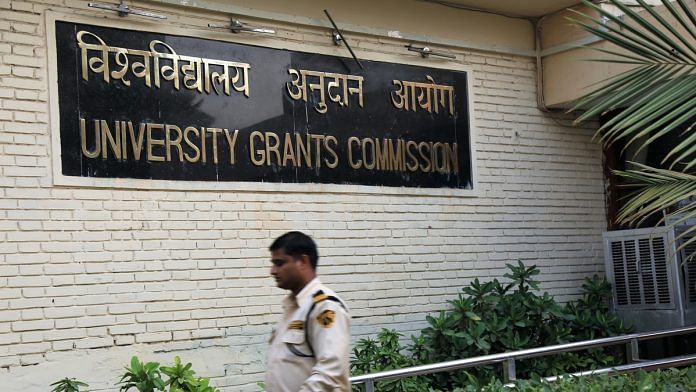
New Delhi: Students who have completed a four-year undergraduate course will be eligible for direct admission to a doctorate programme, the University Grants Commission (UGC) said in its revised PhD regulations notified earlier this week.
The new PhD regulations — “University Grants Commission (Minimum Standards and Procedures for Award of PhD Degree) Regulations, 2022” – says a candidate should have a minimum of 75 percent marks in “aggregate or its equivalent grade on a point scale wherever the grading system is followed”.
In case the candidate does not have 75 percent marks in a four-year undergraduate program, she has to pursue a one-year master’s programme and score at least 55 percent.
The new admission rules further say, “A 1-year master’s degree programme after a 4-year bachelor’s degree programme or a 2-year master’s degree programme after a 3-year bachelor’s degree programme or qualifications declared equivalent to the master’s degree by the corresponding statutory regulatory body, with at least 55% marks in aggregate or its equivalent grade in a point scale wherever grading system is followed.”
No more publishing in peer-reviewed journals
The UGC has removed the clause, “publishing paper in a peer-reviewed journal”, as mandatory for a PhD.
PhD regulations of 2016 had said that PhD scholars “must publish at least one (1) research paper in a refereed journal and make two paper presentations in conferences/seminars before the submission of the dissertation/thesis for adjudication”.
Talking about this, UGC chairperson Professor M. Jagadesh Kumar said, “Publication of research papers in peer-reviewed journals may not be mandatory anymore, but it does not mean PhD scholars should stop doing that altogether.”
He added: “Focussing on high-quality research will lead to publications in good journals, even if it is not mandatory. It will add value when they apply for employment or post-doctoral opportunities.”
Part-time PhD allowed with clause
For a PhD, individual institutions can also hold their own entrance tests to admit students, the new rules state. The candidate then need not write the National Eligibility Test (NET) or similar exams. The “entrance test shall consist of 50 percent research methodology and 50 percent subject specific,” the rules say.
The commission was planning on reserving 40 percent seats for students who qualified through NET, but that clause did not make it in the final notification as there was no consensus.
Apart from this, the commission has also allowed candidates to pursue a PhD through part-time mode, “provided all conditions are fulfilled”.
As per the rules, the institute will require a “No Objection Certificate (NOC)” from the appropriate authority in the organisation where the candidate is employed.
The NOC should clearly mention that she is permitted to pursue studies on a part-time basis. “His/her official duties permit him/her to devote sufficient time for research; if required, he/she will be relieved from the duty to complete the course work,” the new rules say.
The regulations are applicable with immediate effect from the date of notification. Any PhD registered after 1 July, 2009 shall be governed by the regulations of 2009 or 2016, the notification further adds.
Also read: Only 34% Indian schools have internet access, less than 50% have functional computers, shows data
Subscribe to our channels on YouTube , Telegram & WhatsApp
Support Our Journalism
India needs fair, non-hyphenated and questioning journalism, packed with on-ground reporting. ThePrint – with exceptional reporters, columnists and editors – is doing just that.
Sustaining this needs support from wonderful readers like you.
Whether you live in India or overseas, you can take a paid subscription by clicking here .
- PhD admission
LEAVE A REPLY Cancel
Save my name, email, and website in this browser for the next time I comment.
Most Popular
Lok sabha elections 2024 phase-4 live: eci records 40.32% voter turnout till 1 pm, centre to launch its own ott platform, to air ‘clean’ content promoting ‘india’s culture, values’, a showdown in kerala congress expected after ls elections. k sudhakaran at the heart of it.
Required fields are marked *
Copyright © 2024 Printline Media Pvt. Ltd. All rights reserved.
- Terms of Use
- Privacy Policy

IMAGES
VIDEO
COMMENTS
Doing a Master's and then PHD. Doing a Master's first is the traditional route of acquiring a PHD. In many Asian and European countries, you cannot enroll directly in a PHD program right after your bachelor's. You have to complete a one-year or a two-year master's program before becoming eligible for a doctorate program.
If you get into a Doctoral program out of undergrad you are doing something right. Further, most of these programs allow you to get a master's on the way to a Ph.D. Thus, you will shave around a 1-2 years of time if you were to go to a different master and Ph.D program.
Lastly, PhD programs are typically research focused, even for clinical psych. It is important that you have a very clear idea about the questions you want to research in your program. Some people have that figured out by the end of college, but for many people it is useful to invest more time in figuring that out.
Going Directly to Graduate School. There are many benefits to pursuing graduate school immediately following college. As we said, the sooner you begin, the sooner you'll finish. Graduate school is a long haul, and an early start can help reduce the effect of prolonged study on your personal life.
9. There are no real breaks. In a stereotypical "9-to-5" job, when the workday is over or the weekend arrives, you can generally forget about your work. And a vacation provides an even longer respite. But in a PhD program, your schedule becomes "whenever you find time to get your work done."
A Ph.D. is a research degree that involves the production of original knowledge and scholarship. Doctoral degrees have traditionally been regarded as training programs for academics. As such, a Ph.D. program differs from undergraduate or Master's studies. Most Ph.D. programs involve some initial coursework (specific requirements for ...
There might be high entry requirements, but if you can do PhD studies you can clear that bar also. You likely earn more. It's not just for the next 3-5 years that you need for a PhD. If you do a PhD, after you graduate, you'll need to find a job. If you get a job now, you'll already have a job.
Congratulations! You've made it through the first weeks of your Ph.D. program. Right now, it might not feel that different from your undergrad experience. But the full-time research immersion that is soon to come, as well as the independence and required self-direction, will likely be a major adjustment.
Straight to PhD. In the United States, a Master's degree is not required for admission to most PhD programs. It is possible and not unusual to be admitted to a PhD program straight out of undergrad. The number of direct entry PhD programs has started to rise in Canada as well, though earning a Master's and then PhD is still more common.
Ultimately, there are merits in both avenues. Going to graduate school for a master's or doctorate straight after your undergrad is beneficial because you are able to capitalize on the momentum you have gained from the preceding years. Of course, this route also means that you will get to that grad school commencement that much sooner, if ...
1. Talk to your professors. It's a good idea to talk to professors about your interests, especially professors in your field of interest. Not only have they been through the process of obtaining a PhD, but they know other professors and institutions in the field.
Use average ... Ask a PhD Student: Getting In (and Paying for) Grad School. PhD students shed light on writing successful statements of purpose, choosing ... GRE Pop Quiz. Put your skills to the test with our quick GRE quiz. Each practice question has a detailed explanation so you can see how to ...
It can be harder to get accepted into PhD programs straight from undergrad since you've had less time to do research. - Austin Henley. Mar 14, 2017 at 17:24 ... if you go somewhere else for a PhD after a Master's, you'll have to pass their exams, but hopefully the coursework at Department #1 will have prepared you fairly well for them ...
Going to graduate school right after undergrad may be the best option for you if you know for sure that you want a graduate degree. Though undergrad is a long four years, you will already be in the "student" mode of studying and going to class. This can make it easier to power through a master's program. Others who wait to go may develop ...
The relationship isn't linear. Taking some time off doesn't mean be in your 30's. I'm a current undergrad senior and I've gotten acceptances to two biochem PhD programs. More experience probably helps, but it's definitely possible to go from undergrad straight to PhD.
Earning a PhD directly after my undergraduate career became incredibly appealing to me. I learned from colleagues of the benefits of fellowships, along with the convenience of earning both a master's and a PhD within the same program. After returning to the States, I sat down with my academic advisor ready to begin the road to graduate school.
In the UK a PhD (or DPhil) typically starts after a 4-year undergrad program: so yes, it's normal to do a PhD right after your undergrad. At a top-level research institution in the USA (at least in the sciences, and biology is what you said you want to pursue) a Masters is something that you would normally only get if you dropped out of a PhD program: so yes it's normal to do a PhD right after ...
7. Interview - Most of the universities for PhD in the USA offering direct PhD hold a separate interview round for the aspirants. As in most cases, the Ph.D. interviews are conducted by invitation only. The questions are general as well as specific to the subject the candidate wants to pursue.
Yes, it's possible to get a PhD without first having a Masters degree. The conventional route for someone who earns a PhD is to pursue a Bachelor's degree, followed by a Masters degree and then a PhD. However, several students opt to bypass a Master's degree by enrolling onto a doctoral programme as soon as they complete their ...
Perhaps a year in a research lab or wetlab environment. A PhD is a significant, difficult undertaking, and you may benefit from more real experience of lab work so that you can get more from your PhD, while also improving your technical skills and developing your CV to make your applications stronger. 6. Reply.
Admission to Ph.D. in sociology programs is highly competitive, with acceptance rates at some schools as low as 4%. Admissions committees look at several factors when considering grad school ...
A-. A+. New Delhi: Students who have completed a four-year undergraduate course will be eligible for direct admission to a doctorate programme, the University Grants Commission (UGC) said in its revised PhD regulations notified earlier this week. The new PhD regulations — "University Grants Commission (Minimum Standards and Procedures for ...
I did my Master's 4 years after my undergraduate degree, during that time I did the Peace Corps and another job for 2 years. Even though I was a bit older than some of my peers, the Master's degree was a breeze. I'm now 2 years into a PhD and its quite a similar feeling. I'd definitely recommend taking some time, there's no crunch to get one as ...
Good Morning, McFarlin! We are blessed that you've joined us for worship today! Please let us know you're here by visiting the online sign-in page or...